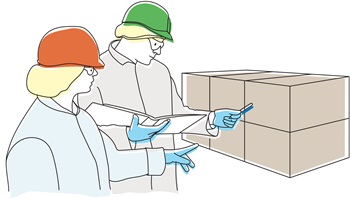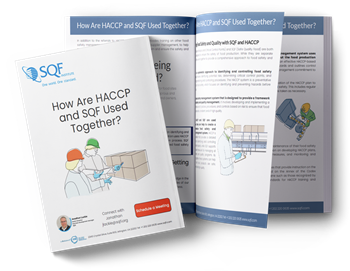Prepare for Your Audit
After registering in the SQF Assessment Database, there are five steps to preparing for your SQF audit, which are outlined below.

Designate an SQF Practitioner
Depending upon the program chosen, you may be required to designate a suitably qualified employee or SQF Practitioner to oversee the development, implementation, review, and maintenance of your SQF system.
The specific requirements for an SQF Practitioner are described in the System Elements, Part B: 2.1.1.4 and 2.1.1.5. You may also be required to have a substitute practitioner to cover all shifts or when the main practitioner is otherwise not available.
Determine the Scope of Certification
Before implementing the SQF Code, you must decide the scope of certification – in other words, the food sector categories, products, and processes to be included in your SQF system.
The scope of certification determines which requirements in your designated SQF Code are to be documented, implemented, and what your certification body will use to audit your food safety practices. The scope will need to be agreed upon between your site and the certification body before the initial certification audit. Once the scope is decided, ensure it is accurately reflected in the SQF Assessment Database.
Need help determining your audit scope?
Document Your SQF System
To achieve SQF Certification, you need to document and implement the System Elements and relevant Good Industry Practices (GIP) requirements of the SQF Code you are being audited against. This is a two-stage process. First, you must prepare the policies, procedures, work instructions, and specifications that meet the system elements and GIP modules of your SQF Code. In other words, “Say what you do.”
Implement Your SQF System
Next, once you are satisfied that the policies, procedures, work instructions, and specifications are in place to meet the SQF requirements, you need to ensure that all documents are being followed and all records demonstrating compliance to the relevant modules of the SQF Code are being kept. In other words, “Do what you say.”
The SQFI recommends that a minimum of 90 days of records are available before a site audit is conducted.
Need Guidance?
Conduct an Optional Pre-Assessment
A pre-assessment is not mandatory but can be helpful to identify the gaps in your programs prior to the initial certification audit. Either an SQF Consultant or your designated employee or SQF Practitioner can conduct an assessment using your own or SQF-provided checklist in our Resource Library.
How Are HACCP and SQF Used Together E-book
This e-book explores how the HACCP and SQF systems are interrelated, including the following:
- SQF Certification requires that companies implement an effective HACCP-based food safety management system that identifies potential hazards and outlines control measures to mitigate them.
- The HACCP system is a preventative approach to food safety, which focuses on identifying and preventing hazards before they occur.
- HACCP is a systematic approach to identifying and controlling food safety hazards. It involves identifying potential risks, determining critical control points, and establishing monitoring and controlling procedures.
- A strong food safety culture means that HACCP principles are already in place, and that you are already taking steps towards SQF Certification.

Take the Risk Test
Find Out How You Compare in Key Risk Areas
Risk management is essential in developing a strong food safety culture. Poor performance in your allergen management, food fraud program, and recall management are key areas that can lead to distrust of your brand and ultimately lead to a massive loss in business.
Take 5 minutes to test your knowledge. Our free test evaluates vital risk areas within your operations, providing a personalized report and actionable recommendations for your site. After taking the test, you will receive results to help identify improvement areas, recommended resources, and steps to success.
Need Help?
Our Customer Service team is here to help you during each step of the certification process.


